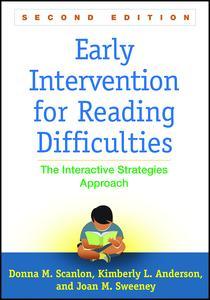Description
Early Intervention for Reading Difficulties, Second Edition (2nd Ed.)
The Interactive Strategies Approach
Solving Problems in the Teaching of Literacy Series
Authors: Scanlon Donna M., Anderson Kimberly L., Sweeney Joan M.
Language: English
Subjects for Early Intervention for Reading Difficulties, Second Edition:
46.39 €
In Print (Delivery period: 15 days).
Add to cart· 17.8x25.4 cm · Paperback
Description
/li>Contents
/li>Readership
/li>Biography
/li>
This book has been replaced by Early Literacy Instruction and Intervention, Third Edition, ISBN 978-1-4625-5365-5.
I. A Comprehensive Approach to Early Intervention
1. The Interactive Strategies Approach
2. Responsive Instruction
3. Motivation to Read and Write
II. Learning the Alphabetic Code
4. Purposes and Conventions of Print
5. Phonological Awareness
6. Letter Naming and Letter Formation
7. Letter–Sound Association
8. The Alphabetic Principle and the Alphabetic Code—Early Development
9. Phonograms and Word Families
10. The Alphabetic Principle and the Alphabetic Code—Later Development
11. Morphological Units and Multisyllabic Words
III. Word Learning
12. Strategic Word Learning
13. High-Frequency Word Learning
IV. Meaning Construction
14. Fluency
15. Vocabulary and Oral Language Development
16. Comprehension and General Knowledge
V. Implementing Intensified Instruction
17. Small-Group and One-to-One Intervention
18. Revisiting and Concluding
References
Index
Donna M. Scanlon, PhD, is Professor in the Department of Literacy Teaching and Learning at the University at Albany, State University of New York. Dr. Scanlon has spent most of her career studying children’s reading difficulties. Her studies have focused on the relationships between instructional characteristics and success in learning to read and on developing and evaluating approaches to preventing and remediating reading difficulties. Findings from studies that she and her colleagues conducted contributed to the emergence of response to intervention as a process for preventing reading difficulties and avoiding inappropriate and inaccurate learning disability classifications. Most recently, Dr. Scanlon’s work has focused on the development of teacher knowledge and teaching skill among both preservice and inservice teachers for the purpose of helping teachers to prevent reading difficulties in young children and remediate reading difficulties among older children.
Kimberly L. Anderson, PhD, is Assistant Professor at East Carolina University in Greenville, North Carolina, where she teaches K-2 literacy methods courses in the Department of Literacy Studies, English Education, and History Education. Her current research focuses on improving small-group, supported literacy instruction in the kindergarten classroom and the relationships between teacher knowledge, teacher practice, and student outcomes with regard to the foundations of reading development. Dr. Anderson worked for several years as a research associate at the Child Research and Study Center, University at Albany, and has contributed to the research on the Interactive Strategies Approach (ISA) by serving as an intervention teacher in an early study; by providing professional development for teachers learning to implement the ISA in the early primary grades in both classroom and intervention settings; and by collaborating with preservice educators from institutions across New York State on enhanc
These books may interest you

Teaching Beginning Writers 56.31 €



